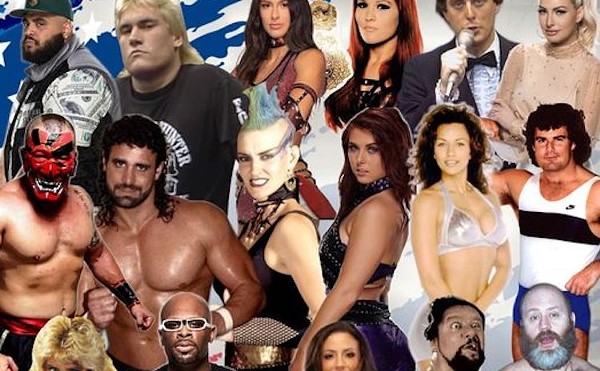Nicolas Cage had a pretty good one, before he started starring in gut-busting dreck like Knowing and Next. The Orlando Magic is compiling a great one with its sudden string of gutsy playoff performances. And Lindsay Lohan? Well, hers has been horrible for years.
We're talking about the crap-to-quality ratio, that ever-shifting pop-culture equation that defines whether something's worth your time and money or not. For the last several years, the undisputed king of craptacularity in the world of video games has been the Nintendo Wii, an otherwise innovative and entertaining console with a crap-game numerator only slightly less imposing than Manny Ramirez's steroid-induced glower.
But in just a few short years, Nintendo's motion-sensitive moneymaker has been surpassed in this dubious department … by Apple's iPhone and iPod Touch. This is no small accomplishment: Remember, the Wii has games like Major Minor's Majestic March and My Horse and Me in its corner.
Not that we're disputing the power of Apple's wondrous gadgets, mind you. Having zipped past the billion-download milestone in April — with a healthy chunk of that figure coming from game apps — it's safe to say that snobbish doubters at certain hard-core gaming sites who prognosticated that Apple's mobile tools would never fly as a gaming platform have been proven dead wrong. When episodic content for franchises like Mass Effect is on the way and Farhad Manjoo, the tech writer at Slate.com, is a convert to the sometime joys of iPhone games, you know you've arrived.
But lord, there's a lot of junk among the thousands of gaming apps users can buy, for as little as 99 cents or as much as 10 bucks. As Axl Rose once memorably screeched, welcome to the jungle. If you don't know what you're doing or looking for — and believe me, the vast majority of users microtransacting their way to lousy knockoffs of Bejeweled and subpar reboots of Konami and Sega classics don't have the first clue what they're blowing their mad money on — you can quickly end up with an iPhone that's more cluttered than the dinner table at the Gosselin house. And far less permanent, too: A recent report compiled by Pitch Media suggested that less than 5 percent of free applications (including and especially games) were still in use a month after being downloaded.
Bummer, because iPod games are the perfect embodiment of one of gamedom's elusive holy grails — the impulse buy. The gamer who saves up $60 to score a copy of InFamous isn't likely to stop playing it after a couple of gaming sessions because it didn't live up to expectations. But when you're burning less than two dollars on somebody's half-ass homebrew platform-shooter, it's far easier to just use your index finger — or maybe even your middle finger — to slide the touch screen and tap to the next app.
Why is this a bad thing? Let's flash back a minute to the Wii. When it debuted to jokes about its dopey name four years ago, few were predicting that Nintendo's console would shred the barriers between hard-core and casual gaming quite as quickly as it did. It could have been an epic opportunity to recruit the masses to the joys of gaming. But because Nintendo cares about maintaining third-party software development standards about as much as Sean Hannity cares about Barack Obama's feelings, the Wii software market became flooded with enough junky games to fill Tomorrowland.
The same has quickly become true for Apple. All you need do to develop a "game" for the App Store is fork over 50 bucks, grab the development kit and spend a few weeks crunching code. As long as your name isn't Trent Reznor and your game doesn't involve shaking babies, you're probably good. (And you're probably on your way to becoming a millionaire.)
Now, you can argue that keeping the entry barriers to application development low spurs democracy, free-market enterprise and creativity, and to a certain degree you'd be right. But it also spawns crap. Lots and lots of crap. You might accidentally stumble into a sublime game like Rolando or Zen Bound, but you're far, far more likely to get suckered by a wonky port of Pole Position or Katamari Damacy, or perhaps one of slightly less than 1,000 forgettable DIY top-down shooters currently available in the App Store. It's an experience akin to what happens to people who dive late into tech fads like Twitter, only to discover that patience and discernment are the keys to nirvana, not clicking "download now" like a TV junkie on a Twinkie high.
Aside from highlighting a shifting short list of top sellers and new titles on the App Store's various landing pages, Apple does absolutely nothing to help its millions of users distinguish the gold from the chaff. Using Vox Populi as your compass is no good, either: The crew that used their credit cards to send a so-so reboot of Sonic the Hedgehog shooting into the top 10 on the paid apps chart are the same ones who keep bumping Katy Perry's songs into the top 10 downloads.
That's a huge missed opportunity. Every time casual gamers get snookered by Rapala Tournament Fishing or Carnival Games on the Wii, it's like a virtual door slamming in their face. The same is true, to a lesser (and less expensive) degree, with a noob who gets burned on a bad download of Super Monkey Ball or Silent Scope. They're that much less likely to take the next step to becoming a serious gamer.
By contrast, let's look at what the folks at Microsoft do to encourage creativity on Xbox Live — they sponsor contests for developers and reward the interesting games with a coveted spot in Xbox Live Arcade. That's how offbeat fare like Dishwasher Dead Samurai sees the light of download. The, um, less impressive stuff is collected under a community games tab, where it's identified as user-created and "not reviewed by ratings boards." That's gamer-speak for "caveat emptor," but in this case, it also doubles as welcome truth in advertising. That kind of filtering and quality control is something Apple's App Store could seriously use. Maybe someone can develop an app for that?
[email protected]















